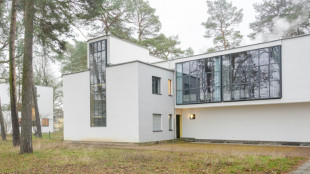
-
 TikTok plans total US shutdown as ban deadline looms: report
TikTok plans total US shutdown as ban deadline looms: report
-
Ghana to probe former president's huge cathedral project

-
 Easterby sticks by Six Nations-winning veterans in first Irish squad
Easterby sticks by Six Nations-winning veterans in first Irish squad
-
Scotland recall Jonny Gray for Six Nations

-
 UN rights chief says transitional justice 'crucial' in Syria
UN rights chief says transitional justice 'crucial' in Syria
-
US consumer inflation rises to 2.9 percent in December

-
 Germany's Thiaw to miss Juve and Champions League clashes with hamstring injury: AC Milan
Germany's Thiaw to miss Juve and Champions League clashes with hamstring injury: AC Milan
-
France name Jegou, Auradou in Six Nations squad

-
 Lategan back on top as Roma hands Ford first Dakar stage win in 10 years
Lategan back on top as Roma hands Ford first Dakar stage win in 10 years
-
Mozambique's new president vows 'unity' as sworn in amid deadly protests

-
 Russia PM meets Vietnam president, seeking deeper ties
Russia PM meets Vietnam president, seeking deeper ties
-
'New blood is coming': Mensik dumps Ruud out of Australian Open

-
 Syria sex abuse survivors need aid, says Nobel winner Mukwege
Syria sex abuse survivors need aid, says Nobel winner Mukwege
-
Hammers boss Potter ready to make do and mend amid striker shortage

-
 Zverev cruises into Australian Open third round
Zverev cruises into Australian Open third round
-
Ancelotti demands Real Madrid response after Clasico drubbing

-
 Serve better! Gauff outlines must-do for next Melbourne clash
Serve better! Gauff outlines must-do for next Melbourne clash
-
Benn and Eubank Jr boxing bout set to finally take place in London in April

-
 German economy shrinks again amid political crisis
German economy shrinks again amid political crisis
-
Spain hosted record 94 mn foreign tourists in 2024

-
 Thai PM says nearly fell for foreign leader phone scam
Thai PM says nearly fell for foreign leader phone scam
-
European stocks climb as inflation takes centre stage

-
 Teenager Mensik sends sixth seed Ruud crashing out of Australian Open
Teenager Mensik sends sixth seed Ruud crashing out of Australian Open
-
Russia strikes Ukraine energy sites in 'massive' barrage

-
 Dyche says Everton exit came at 'the right time'
Dyche says Everton exit came at 'the right time'
-
Australia mulls 'all options' after citizen reported killed by Russian forces

-
 Djokovic creates slice of history as Zheng stunned in Melbourne
Djokovic creates slice of history as Zheng stunned in Melbourne
-
Gauff overcomes wobble to roll into Australian Open last 32

-
 BP nears deals for oil fields, curbs on gas flaring in Iraq
BP nears deals for oil fields, curbs on gas flaring in Iraq
-
Mozambique inaugurates new president after deadly post-election unrest

-
 Syrian activists work to avoid return to dictatorship
Syrian activists work to avoid return to dictatorship
-
Holy dips at India's giant Hindu festival come with challenge

-
 Thousands to be evacuated after Mount Ibu eruption
Thousands to be evacuated after Mount Ibu eruption
-
'Thrilled': Record-setting Djokovic trumps Federer on way to round three

-
 Alcaraz, Djokovic tip 'incredible' teenager Fonseca for the top
Alcaraz, Djokovic tip 'incredible' teenager Fonseca for the top
-
Cocaine use nearly doubles in France: study

-
 Beijing 'firmly opposes' US ban on smart cars with Chinese tech
Beijing 'firmly opposes' US ban on smart cars with Chinese tech
-
Equities mixed as US inflation, China data loom

-
 UK inflation dips, easing some pressure on government
UK inflation dips, easing some pressure on government
-
India's triple naval launch shows 'self-reliance': Modi

-
 Wallabies great Hooper set for comeback aged 33 with Japan move
Wallabies great Hooper set for comeback aged 33 with Japan move
-
German bourse banks on Trump-fuelled crypto boom

-
 Record 36.8 million tourists visited Japan in 2024
Record 36.8 million tourists visited Japan in 2024
-
Trump's policies won't push up inflation, economic advisor says

-
 German far-right AfD takes aim at Bauhaus movement
German far-right AfD takes aim at Bauhaus movement
-
Djokovic makes slice of history as Zheng stunned in Melbourne

-
 The journalists behind Sarkozy's Libya corruption woes
The journalists behind Sarkozy's Libya corruption woes
-
SpaceX set for seventh test of Starship megarocket

-
 Record-setting Djokovic trumps Federer on way to Melbourne third round
Record-setting Djokovic trumps Federer on way to Melbourne third round
-
Private US, Japanese lunar landers launch on single rocket

| RBGPF | -2.19% | 60.67 | $ | |
| VOD | 2.2% | 8.436 | $ | |
| SCS | 1.92% | 11.46 | $ | |
| RELX | 1.85% | 46.947 | $ | |
| RYCEF | -0.58% | 6.91 | $ | |
| CMSC | 1.06% | 23.125 | $ | |
| GSK | 2.18% | 32.795 | $ | |
| RIO | 0.7% | 60.806 | $ | |
| BTI | -0.46% | 35.555 | $ | |
| BCE | 0.97% | 22.76 | $ | |
| AZN | 0.26% | 65.54 | $ | |
| CMSD | 0.34% | 23.279 | $ | |
| BP | 0.28% | 31.177 | $ | |
| NGG | 2.71% | 57.84 | $ | |
| BCC | 2.88% | 127.27 | $ | |
| JRI | 0.77% | 12.19 | $ |

Brazil's Bolsonaro bets on 'moderate' tone to win vote: minister
Far-right President Jair Bolsonaro is not exactly known for mild rhetoric, but with Brazil deeply divided heading into elections, he is counting on a more moderate image and economic upturn to win, his communications minister says.
Bolsonaro is trailing his leftist nemesis, ex-president Luiz Inacio Lula da Silva (2003-2010), ahead of the October 2 election, bruised by a weak economy, his controversial handling of Covid-19 and what critics call his extremism.
But his charismatic, cool-tempered communications chief, Fabio Faria, says he is confident a critical mass of Brazilians will ultimately pick Bolsonaro over four more years of the Workers' Party (PT), whose time in power crashed to an end in 2016 with a corruption scandal, recession and the impeachment of Lula's hand-picked successor, Dilma Rousseff.
Surging onto the national scene in the wake of that triple crisis, Bolsonaro won the presidency in 2018 with broad support, taking 55 percent of the vote.
And though some of those voters are disillusioned today, Bolsonaro's camp is confident the incumbent will win them back with a softer tone and an improving economy, Faria told AFP in an interview at the presidential palace in Brasilia.
Known for downplaying Covid-19 as a "little flu," urging Brazilians to stop being "sissies" about the pandemic, and attacking institutions such as the Superior Electoral Tribunal, whose new chief he once called a "scumbag," Bolsonaro has been dialing his rhetoric down a notch, Faria said.
"The president's more moderate tone speaks to voters who had turned against him because they felt the president's style could have been more moderate," said the telegenic 44-year-old, a businessman and ex-congressman brought in to give the administration a communications makeover in June 2020.
"A lot of people who voted for Bolsonaro (in 2018) and then left his camp are coming back because they're anti-PT voters. The PT left a huge stain of corruption in the past, and voters... are coming back because they see Brazil is polarized between Bolsonaro and Lula -- there's no third candidate."
As evidence of Bolsonaro's softer touch, he offered the incumbent's prime-time interview Monday on TV Globo, the biggest broadcaster in the country of 213 million people.
Despite being a fierce critic of Globo and the "fake news" media in general, Bolsonaro was less aggressive than usual during the interview.
But he drew criticism for casting doubt on whether he would accept the election result if he loses.
Bolsonaro, who has repeatedly attacked Brazil's election system as fraud-prone -- with little evidence -- said he would respect the outcome "as long as the elections are clean and transparent."
- Riding an upturn? -
Lula leads Bolsonaro by 47 percent to 32 percent, according to the latest poll from the Datafolha institute.
Ten other contenders are polling in single digits.
If no candidate wins more than 50 percent of valid votes in the first round, the election will go to a runoff on October 30.
Faria said Bolsonaro is betting an improving economy will boost him to victory.
Like many countries, Brazil is suffering from surging prices, fueled by the effects of the pandemic and Russia's invasion of Ukraine.
The Latin American giant's annual inflation rate came in at 10.07 percent last month, far above the central bank's target of 3.5 percent.
But prices posted a record drop of 0.68 percent in July, thanks partly to government fuel tax cuts.
Bolsonaro has also passed a massive social spending program called Auxilio Brasil that recently began making welfare payments of around $110 a month to some 20 million families.
Critics blast the move as economic populism. Supporters say it is just plain popular.
"People are starting to realize Brazil is better off than other countries," said Faria.
"The economy is going to get Bolsonaro reelected."
O.Bulka--BTB
